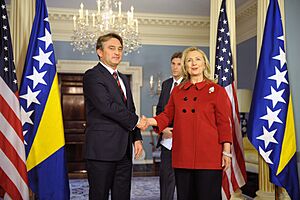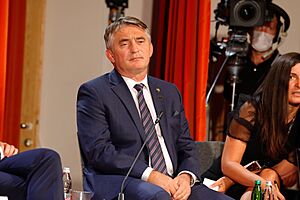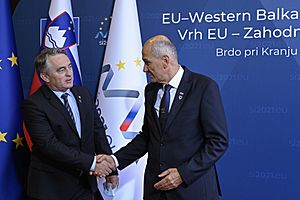Željko Komšić facts for kids
Quick facts for kids
Željko Komšić
|
|||||||||||||
|---|---|---|---|---|---|---|---|---|---|---|---|---|---|
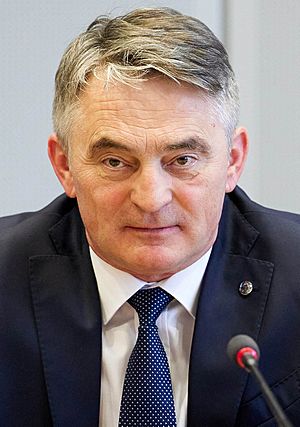
Komšić in 2023
|
|||||||||||||
| 12th Chairman of the Presidency of Bosnia and Herzegovina | |||||||||||||
| Assumed office 16 July 2025 |
|||||||||||||
| Preceded by | Željka Cvijanović | ||||||||||||
| In office 16 July 2023 – 16 March 2024 |
|||||||||||||
| Preceded by | Željka Cvijanović | ||||||||||||
| Succeeded by | Denis Bećirović | ||||||||||||
| In office 20 July 2021 – 20 March 2022 |
|||||||||||||
| Preceded by | Milorad Dodik | ||||||||||||
| Succeeded by | Šefik Džaferović | ||||||||||||
| In office 20 July 2019 – 20 March 2020 |
|||||||||||||
| Preceded by | Milorad Dodik | ||||||||||||
| Succeeded by | Šefik Džaferović | ||||||||||||
| In office 10 July 2013 – 10 March 2014 |
|||||||||||||
| Preceded by | Nebojša Radmanović | ||||||||||||
| Succeeded by | Bakir Izetbegović | ||||||||||||
| In office 10 July 2011 – 10 March 2012 |
|||||||||||||
| Preceded by | Nebojša Radmanović | ||||||||||||
| Succeeded by | Bakir Izetbegović | ||||||||||||
| In office 6 July 2009 – 6 March 2010 |
|||||||||||||
| Preceded by | Nebojša Radmanović | ||||||||||||
| Succeeded by | Haris Silajdžić | ||||||||||||
| In office 6 July 2007 – 6 March 2008 |
|||||||||||||
| Preceded by | Nebojša Radmanović | ||||||||||||
| Succeeded by | Haris Silajdžić | ||||||||||||
| 6th Croat Member of the Presidency of Bosnia and Herzegovina | |||||||||||||
| Assumed office 20 November 2018 |
|||||||||||||
| Prime Minister | Denis Zvizdić Zoran Tegeltija Borjana Krišto |
||||||||||||
| Preceded by | Dragan Čović | ||||||||||||
| In office 6 November 2006 – 17 November 2014 |
|||||||||||||
| Prime Minister | Adnan Terzić Nikola Špirić Vjekoslav Bevanda |
||||||||||||
| Preceded by | Ivo Miro Jović | ||||||||||||
| Succeeded by | Dragan Čović | ||||||||||||
|
|||||||||||||
|
|||||||||||||
| Personal details | |||||||||||||
| Born | 20 January 1964 Sarajevo, SR Bosnia and Herzegovina, SFR Yugoslavia |
||||||||||||
| Political party | Democratic Front (2013–present) | ||||||||||||
| Other political affiliations |
Social Democratic Party (1997–2012) | ||||||||||||
| Spouse |
Sabina Komšić
(m. 1996) |
||||||||||||
| Children | 1 | ||||||||||||
| Alma mater | University of Sarajevo (LL.B.) | ||||||||||||
| Occupation | Politician | ||||||||||||
| Awards | |||||||||||||
| Military service | |||||||||||||
| Allegiance | |||||||||||||
| Branch/service | Army of the Republic of Bosnia and Herzegovina | ||||||||||||
| Years of service | 1992–1996 | ||||||||||||
| Rank | Platoon leader | ||||||||||||
| Unit |
|
||||||||||||
| Battles/wars | Bosnian War | ||||||||||||
Željko Komšić (born 20 January 1964) is a politician from Bosnia and Herzegovina. He is currently serving as the Croat member of the Presidency of Bosnia and Herzegovina. He has held this important role since 2018.
The Presidency of Bosnia and Herzegovina has three members. Each member represents one of the country's main groups: Bosniaks, Serbs, and Croats. Mr. Komšić also became the chairman of the Presidency in July 2025. Before this, he was a member of the country's House of Representatives from 2014 to 2018.
Born in 1964, Komšić finished his studies at the University of Sarajevo in 1988. He served in the Army of the Republic of Bosnia and Herzegovina during the Bosnian War. For his service, he received a special award called the Order of the Golden Lily. After the war, he started his political career.
He was first elected to the Presidency in 2006 and again in 2010. He later started his own political party, the Democratic Front, in 2013. He was elected to the Presidency for a third time in 2018 and a fourth time in 2022. This makes him the longest-serving member of the Presidency.
Contents
Early Life and Education
Željko Komšić was born on 20 January 1964 in Sarajevo. His father, Marko Komšić, was a Bosnian Croat, and his mother, Danica Stanić, was a Bosnian Serb. His mother passed away during the siege of Sarajevo. At that time, he was serving in the Army of the Republic of Bosnia and Herzegovina.
Komšić earned a law degree from the University of Sarajevo. In 2003, he was chosen to represent Bosnia and Herzegovina at a special leadership seminar in Georgetown, USA.
Early Political Career
After the war, Komšić began his political journey with the Social Democratic Party of Bosnia and Herzegovina. He served as a councilman in the municipality of Novo Sarajevo and in the city council of Sarajevo. In 2000, he became the head of the Novo Sarajevo municipal government.
He also served as the deputy mayor of Sarajevo for two years. Later, he became the Bosnian ambassador to the former FR Yugoslavia in Belgrade. He left this role in 2002 when his party went into opposition.
First Time in the Presidency (2006–2014)
2006 Election Victory
In the 2006 Bosnian general election, Komšić ran for the Croat seat in the Presidency of Bosnia and Herzegovina. He won with 116,062 votes, which was 39.6% of the total. He was sworn into office on 6 November 2006.
Some people, especially Bosnian Croats, felt that he was elected mostly by Bosniak voters. This led to discussions about how representatives are chosen in the country.
2010 Re-election
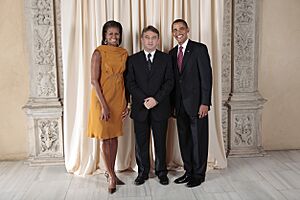
In the 2010 Bosnian general election, Komšić was re-elected. He received 337,065 votes, which was 60.6% of the total.
His win in 2010 also caused debate among Croat political groups. They argued that because of the voting system, a candidate for the Croat seat could be elected even without strong support from the Croat community. This was because voters in the Federation of Bosnia and Herzegovina could choose to vote for either a Bosniak or a Croat representative. Since Bosniaks make up a larger part of the Federation's population, many of Komšić's votes came from areas with mostly Bosniak residents.
Domestic Policies and Party Change
In 2008, Komšić responded to a statement by another Presidency member about the number of languages in Bosnia and Herzegovina. Komšić stated that it was not up to one person to decide this.
A study in 2010 showed that Komšić was a very popular politician among Bosniaks. In July 2012, he left the Social Democratic Party. A year later, on 7 April 2013, he and others founded a new party called the Democratic Front (DF). This party focuses on social democratic and civic-nationalist ideas.
Second Time in the Presidency (2018–Present)
2018 Election
Komšić announced on 11 January 2018 that he would run for the Presidency again in the 2018 Bosnian general election. He sought to be the Croat member once more.
On 7 October 2018, he was elected to the Presidency for a third term. He received 52.64% of the votes. The previous Croat member, Dragan Čović, came in second.
Domestic Policies and Re-election
In March 2019, Komšić appointed Serbian politician Čedomir Jovanović as his advisor. In September 2019, he publicly supported the first BIH Pride March in Sarajevo. He said that Bosnia and Herzegovina is a country where everyone can live as they wish.
In May 2021, Komšić and Šefik Džaferović, the Bosniak member of the Presidency, attended a military exercise with the United States Army and the Armed Forces of Bosnia and Herzegovina. The Serb member, Milorad Dodik, did not attend.
In November 2021, Komšić commented on protests by miners. He suggested that the director of the public electric utility company should resign.
In the 2022 Bosnian general election, Komšić was re-elected for a fourth term. He received 55.80% of the votes. He was sworn in on 16 November 2022, along with the new members Denis Bećirović and Željka Cvijanović.
After the 2022 election, a new government was formed. Borjana Krišto was chosen as the new Chairwoman of the Council of Ministers. Komšić voted against her nomination, stating she did not present her program clearly.
COVID-19 Pandemic Response
When the COVID-19 pandemic in Bosnia and Herzegovina began in March 2020, the Presidency announced that the Armed Forces would set up quarantine tents at the country's borders. This was for Bosnian citizens returning home. Everyone arriving had to self-quarantine for 14 days.
In March 2021, Serbian President Aleksandar Vučić visited Sarajevo. He met with Komšić and other Presidency members and donated 10,000 doses of AstraZeneca COVID-19 vaccines. A few days later, Slovenian President Borut Pahor also visited and promised to donate 4,800 AstraZeneca vaccines.
Military Helicopters Issue
In August 2021, Komšić and Džaferović asked the Ministry of Security to use military helicopters to help put out wildfires in Herzegovina. This happened after Dodik, the third Presidency member, refused to give his consent. All three members must agree for military helicopters to be used.
Foreign Policy and International Relations
After the 2018 election, the Prime Minister of Croatia, Andrej Plenković, criticized Komšić's victory. Komšić replied that the Croatian Government was undermining Bosnia and Herzegovina's independence.
In December 2020, Komšić refused to attend a visit by Russian foreign minister Sergey Lavrov. He felt that Lavrov had shown disrespect to Bosnia and Herzegovina. Džaferović also refused to attend for the same reasons.
In September 2021, Komšić traveled to New York City to speak at the United Nations General Assembly. He met with the UN Secretary-General António Guterres and the Austrian president. He spoke about political challenges, the COVID-19 pandemic, and climate change. He also met with the presidents of Montenegro and Kosovo. In November 2021, Komšić attended the 2021 United Nations Climate Change Conference, where he met British Prime Minister Boris Johnson.
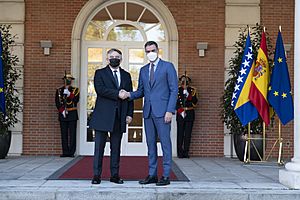
On 17 January 2022, he met with Pope Francis in Vatican City. Pope Francis praised Komšić, calling him "a good person." On 9 February 2022, Komšić visited Madrid. He met with Spanish Prime Minister Pedro Sánchez and spoke with King Felipe VI.
After Russia recognized two disputed regions in Ukraine in February 2022, Komšić strongly condemned "Russia’s attack on the territory of Ukraine." When Russia invaded Ukraine, Komšić stated that Bosnia and Herzegovina would support Ukraine as much as it could.
In October 2023, after an attack by Hamas on Israel, Komšić commented that Hamas's actions were those of desperate people. He criticized the Chairwoman of the Council of Ministers, Borjana Krišto, for supporting Israel.
European Union Relations
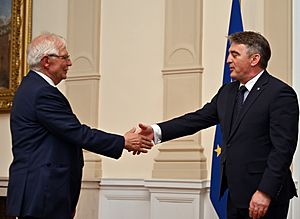
In September 2020, Komšić and his fellow Presidency members said that Bosnia and Herzegovina could become an EU candidate country in 2021 if it made successful reforms.
On 30 September 2021, Komšić, Džaferović, and Dodik met with European Commission President Ursula von der Leyen in Sarajevo. This was part of her visit to Bosnia and Herzegovina.
In December 2021, Komšić and Džaferović met with German Minister of State for Europe Michael Roth. They discussed the political situation and reforms needed for Bosnia and Herzegovina to join the EU.
In December 2022, the European Council recognized Bosnia and Herzegovina as a candidate country for EU membership. Komšić strongly supported this decision. On 8 February 2024, the Presidency agreed to start talks with Frontex, which was a key step for EU negotiations. On 21 March 2024, all 27 EU leaders agreed to open EU membership talks with Bosnia and Herzegovina.
Relations with Turkey
On 16 March 2021, Komšić, Džaferović, and Dodik visited Turkey. They met with Turkish President Recep Tayyip Erdoğan. Erdoğan promised to donate 30,000 COVID-19 vaccines to Bosnia and Herzegovina. They also agreed on mutual recognition of driving licenses and cooperation on infrastructure projects, including a highway from Sarajevo to Belgrade.
On 27 August 2021, Erdoğan visited Sarajevo. He met with the three Presidency members to discuss economic cooperation and the highway project.
Balkan Non-Papers
In April 2021, Komšić sent a "non-paper" to EU foreign ministers. He criticized how EU delegations treated some nationalistic parties in Bosnia. His paper also focused on Russian influence and interference from Croatia and Serbia. The same month, Komšić reacted to a supposed "non-paper" from Slovenian Prime Minister Janez Janša about possible border changes in the Western Balkans.
Personal Life
Željko Komšić's maternal family comes from the village of Kostajnica. His paternal family is from Kiseljak. Komšić was baptized a Catholic, like his father. However, he is now a self-described agnostic. His wife, Sabina, is a Bosniak, and they have a daughter named Lana.
Komšić was one of the people who signed the Declaration on the Common Language for Croats, Serbs, Bosniaks, and Montenegrins. He is a big fan of the football club Željezničar from Sarajevo.
In July 2025, Komšić had a successful heart procedure in Sarajevo.
Awards
| Award or decoration | Country | Awarded by | Year | Place | |
|---|---|---|---|---|---|
| Order of the Golden Lily | Alija Izetbegović | 1995 | Sarajevo | ||
Images for kids
See also
 In Spanish: Željko Komšić para niños
In Spanish: Željko Komšić para niños
 | Toni Morrison |
 | Barack Obama |
 | Martin Luther King Jr. |
 | Ralph Bunche |


